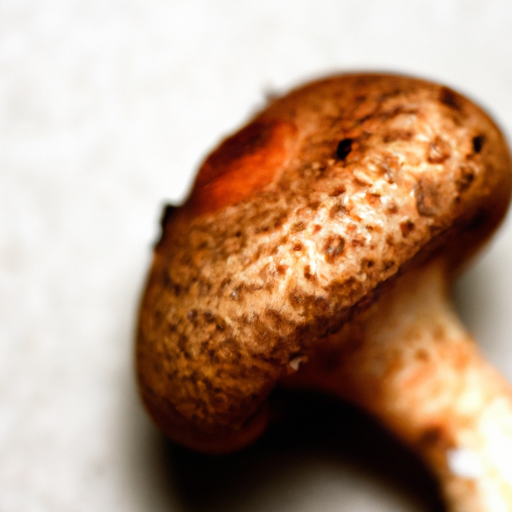In this article, you will learn about the impact of mushrooms on hypertension. We will discuss how mushrooms may affect high blood pressure and whether certain types of mushrooms can help manage hypertension. Additionally, we will explore the overall cardiovascular benefits of incorporating mushrooms into your diet.
When it comes to mushrooms and hypertension, there is evidence to suggest that certain mushrooms may have a positive impact on managing high blood pressure. For instance, some studies have found that consuming certain varieties of mushrooms, such as shiitake and maitake, may help lower blood pressure levels. Furthermore, mushrooms are packed with nutrients that contribute to cardiovascular health, such as potassium and antioxidants, which can help maintain healthy blood pressure levels. By including mushrooms in your diet, you may be able to promote better cardiovascular health and manage hypertension.

The Impact of Mushrooms on Hypertension
Introduction
Hypertension, or high blood pressure, is a serious health condition that affects millions of people worldwide. It is often referred to as the “silent killer” because it can lead to serious complications such as heart attacks and strokes if left untreated. While medication and lifestyle changes are commonly recommended for managing hypertension, researchers are also exploring the potential benefits of incorporating certain foods into the diet to help control blood pressure. In recent years, mushrooms have gained attention for their potential impact on hypertension and overall cardiovascular health. In this article, we will delve into the relationship between mushrooms and hypertension, exploring whether certain mushrooms can help manage high blood pressure and discussing the overall cardiovascular benefits of mushrooms.
Mushrooms and Hypertension
Mushrooms are a versatile and nutritious food that is rich in essential vitamins, minerals, and antioxidants. They have long been praised for their immune-boosting properties and ability to enhance overall well-being. Recent studies have revealed that certain mushrooms may also play a role in managing hypertension.
Enzyme Inhibition
One theory suggests that mushrooms’ potential impact on hypertension lies in their ability to inhibit the action of an enzyme called angiotensin-converting enzyme (ACE). This enzyme is involved in the production of angiotensin II, a hormone that causes blood vessels to narrow and constrict, leading to increased blood pressure. By inhibiting ACE, mushrooms may help relax blood vessels, promoting better blood flow and reducing hypertension.
Potassium Content
Another reason mushrooms may be beneficial for individuals with hypertension is their potassium content. Potassium is an essential mineral that helps regulate blood pressure by counteracting the effects of sodium. High sodium intake is known to contribute to hypertension, as it causes the body to retain water, placing extra stress on the blood vessels and heart. Potassium, on the other hand, helps remove excess sodium from the body through urine, thereby reducing blood pressure.
Specific Mushrooms for Hypertension
While most types of mushrooms provide valuable nutrients and contribute to overall health, certain varieties have been specifically studied for their potential impact on hypertension.
Shiitake Mushrooms
Shiitake mushrooms, widely consumed in Asian cuisine, have been recognized for their medicinal properties for centuries. Recent scientific studies have shown promising results regarding their potential role in managing hypertension. Shiitake mushrooms contain a compound called eritadenine, which has been found to possess blood pressure-lowering effects. Additionally, these mushrooms are rich in potassium and low in sodium, further contributing to their potential to help control blood pressure levels.
Maitake Mushrooms
Maitake mushrooms, also known as “hen of the woods,” have long been revered in traditional medicine for their immune-boosting properties. In recent years, research has shown that maitake mushrooms may also play a role in managing hypertension. Like shiitake mushrooms, maitake mushrooms are low in sodium and high in potassium, making them a suitable addition to a blood pressure-friendly diet.
Reishi Mushrooms
Reishi mushrooms, highly valued in traditional Chinese medicine, have gained recognition in Western countries for their potential health benefits. Studies have suggested that reishi mushrooms may help lower blood pressure by inhibiting ACE activity and promoting relaxation of blood vessels. Additionally, reishi mushrooms are known for their anti-inflammatory properties, which can have a positive impact on overall cardiovascular health.
Other Cardiovascular Benefits of Mushrooms
Beyond their potential impact on blood pressure, mushrooms offer several other cardiovascular benefits that make them an excellent addition to a heart-healthy diet.
Cholesterol Management
High cholesterol levels significantly contribute to the development of cardiovascular diseases, including hypertension. Research has shown that incorporating mushrooms into the diet can help manage cholesterol levels. Certain compounds found in mushrooms, such as beta-glucans, can hinder the absorption of cholesterol in the gut, leading to lower levels of LDL (bad) cholesterol in the bloodstream.
Antioxidant Properties
Mushrooms are a rich source of antioxidants, which help protect the body’s cells from oxidative stress caused by harmful free radicals. Oxidative stress can lead to inflammation and damage to blood vessels, increasing the risk of hypertension and other cardiovascular diseases. Including mushrooms in your diet can help combat this oxidative stress and promote cardiovascular health.
Conclusion
While more research is needed to fully understand the impact of mushrooms on hypertension, the existing studies suggest that mushrooms, particularly varieties like shiitake, maitake, and reishi, may have a positive impact on blood pressure regulation. Their ability to inhibit ACE, their potassium content, and other cardiovascular benefits make mushrooms a valuable addition to a heart-healthy diet. However, it is essential to remember that diet alone cannot replace medication or lifestyle changes recommended by healthcare professionals. As always, it is important to consult with a healthcare professional before making any significant changes to your diet or treatment plan. By incorporating mushrooms into your meals, you can add a delicious and potentially beneficial ingredient to your efforts in managing hypertension and improving your cardiovascular health.


